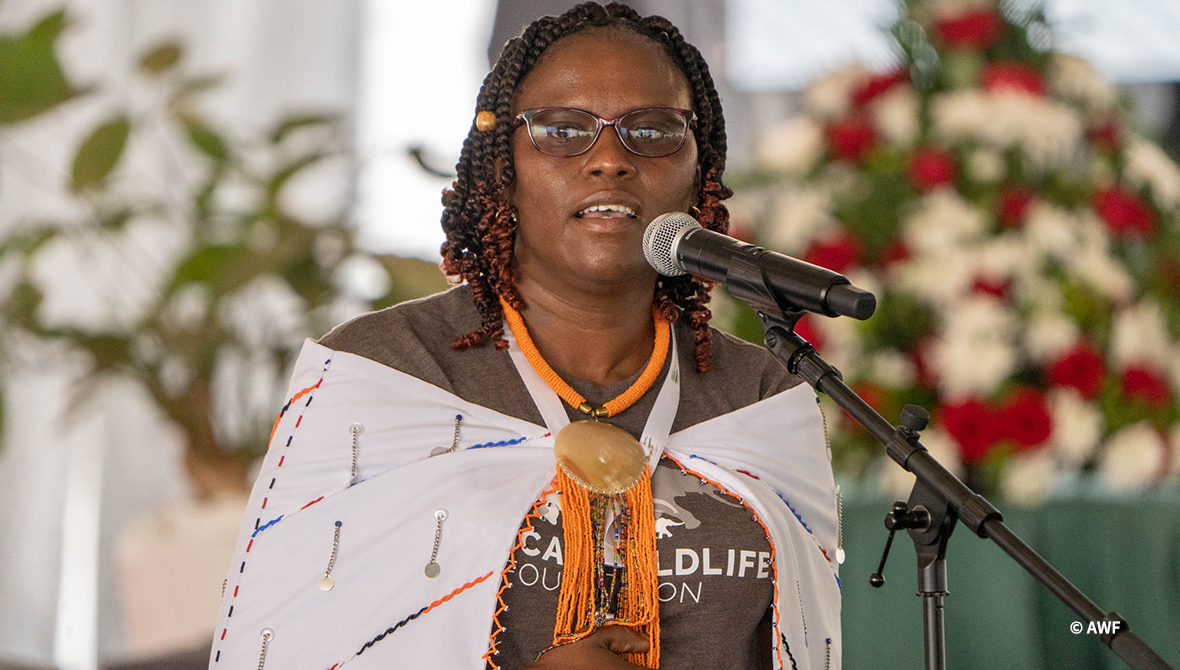Championing inclusion in conservation

On International Women's Day, we celebrate the women at the African Wildlife Foundation who are making invaluable contributions to our world, like Nancy Githaiga, the AWF Kenya Country Director. Her expertise in hydrology and commitment to promoting the role of women in protecting our planet is truly inspiring. Let's learn from her experiences and insights and work together towards an inclusive future.
Q: How does AWF Kenya actively engage women in conservation efforts?
A: Women are critical to conservation; they are natural nature stewards. We actively encourage and create room for women to participate. For example, the head of security for the community scouts in Lumo is Dontilla Wakesho a young passionate woman. We work to build their capacities so they can take on leadership roles traditionally held by men.
While women in Kenya may not own much land, they are the primary land users. When mapping land use, we ensure their voices are heard because they manage and rely on the land for their livelihoods. As natural stewards, including them in decision-making is crucial for successful conservation.
This is further exemplified by our recent Charles Hall Fellows graduation ceremony, where we had equal representation of women. I firmly believe the future of conservation is female.
Q: Can you share your experiences navigating the field of conservation as a woman?
A: Traditionally, conservation was seen as a male-dominated field. Women often faced a stark choice between family and pursuing a career in conservation. This explains the historical imbalance in the field.
However, opportunities for remote work offer a solution. By allowing flexibility, women can contribute their skills and expertise equally to men. Conservation requires a diverse set of skills, and women have much to offer.
Q: How does AWF Kenya integrate community and conservation aspects to achieve a positive impact?
A: We recognize that safeguarding resources requires collaboration with communities. The outdated colonial mindset of "protecting resources from the people" is no longer sustainable. In Kenya, only 10% of land is government protected. Kenya’s commitment under the 30 by 30 (The effective protection and management of 30% of our terrestrial, inland water, and coastal and marine areas by the year 2030) cannot be achieved without the community and their land.
How can we effectively manage these resources without involving the communities that have been responsible for their stewardship for generations?
A: Therefore, we partner with communities to optimize their existing practices and empower them to safeguard their natural resources, leading to positive outcomes for both conservation and local communities.
Q: As we celebrate International Women's Day, what message do you have for other women, both in conservation and other fields?
A: This year's theme, "Invest in Women, Accelerate Progress," resonates deeply with me. I urge leaders to actively create space for young women, recognizing that the playing field is not yet level. While we hope this will change eventually, mentorship and encouragement and key-dropping are essential to bring more women into this critical field. After all, women have a natural connection and propensity towards caring for the environment. We are the ones who connect more with water scarcity, with children sick from water-borne/related or air pollution illnesses and with unproductive soils.
Q: What motivates you the most in your work?
A: My motivation is rooted in intergenerational equity. We have the resources we need: water, air, and food. However, neglecting these resources now will have devastating consequences for future generations. My greatest fear is my children asking, "What were you thinking?" when they look back at our environmental choices.
Q: Do you see progress in the space for women in conservation?
A: We have come a long way, and it's important to celebrate even small victories. While positions like mine are still uncommon for women, we are increasingly gaining platforms to share our vision for conservation. There is room for improvement, but we are moving in the right direction.
Q: Any final thoughts?
A: We often hear about women being the future of conservation. However, I believe it's more than just a future possibility. It's a present responsibility, and we have a duty to act. Let's not leave future generations wondering what we were thinking.